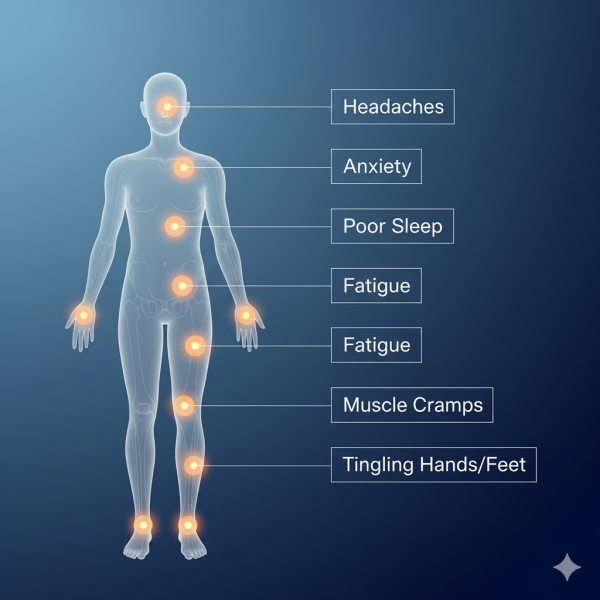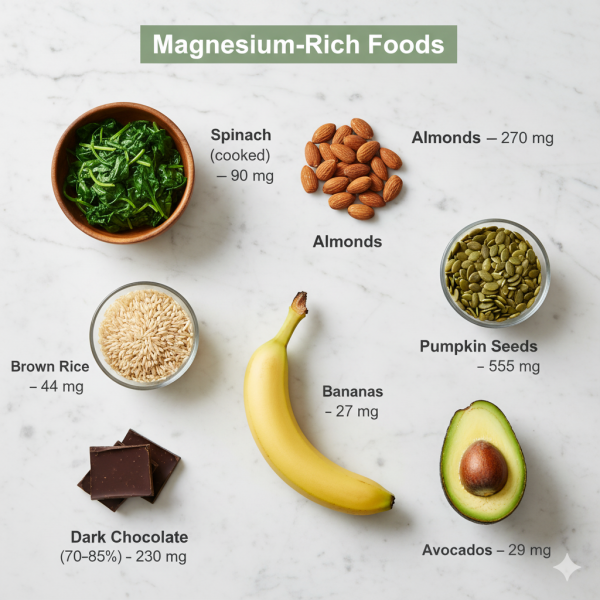
If you often feel drained, crave coffee all day, or lie awake with racing thoughts, your body might be missing magnesium. This quiet mineral helps you relax, sleep better, and manage stress. Yet, experts say most people don’t get enough of it through food or lifestyle habits.
The most overlooked mineral in modern life
Low magnesium is easy to miss because its symptoms overlap with everyday tiredness or stress. Despite being vital for more than 300 chemical reactions in the body, this mineral often goes unnoticed.
According to the , magnesium supports muscle and nerve function, blood pressure control, and energy production. Yet most people don’t get enough from their diet. Doctors now call it an “invisible deficiency” behind many common health complaints.
Why magnesium matters so much
Magnesium helps regulate the body’s stress response by balancing cortisol, the main stress hormone. It also activates the part of your nervous system that helps you relax and sleep. When levels drop, people often report anxiety, muscle tension, or disturbed sleep.
A and summarized by notes that magnesium deficiency can cause fatigue, headaches, and muscle cramps. It also plays a role in heart health. Low levels have been linked to high blood pressure and arrhythmia.
The modern lifestyle problem
The issue is not lack of awareness. It is how we live. Diets high in processed food, chronic stress, and excess coffee or alcohol all deplete magnesium. Even sweating during workouts or living in polluted cities increases magnesium loss.
Refined grains and packaged snacks, staples of urban diets, contain little magnesium because processing removes the nutrient-rich outer layer. Over time, this slow depletion adds up, especially for people with restrictive diets or gut issues like IBS or celiac disease that reduce absorption.

Signs your magnesium may be low
Symptoms of magnesium deficiency appear slowly and are easy to miss. Common signs include:
- Muscle cramps or twitching eyelids
- Restless sleep or frequent awakenings
- Fatigue despite adequate rest
- Headaches or migraines
- Tingling or numbness in hands and feet
- Unexplained anxiety or low mood

If these sound familiar, a blood test can help. However, magnesium levels in blood reflect only a small part of thebody’s total magnesium. Doctors usually consider symptoms and diet together.
Magnesium and better sleep
Magnesium helps the brain relax by binding to GABA receptors, the same neurotransmitters targeted by many sleep medications.
A found that older adults who took magnesium supplements slept better, woke up less often, and had improved melatonin levels. Adding magnesium-rich foods may support deeper, more restful sleep over time.
The best natural sources of magnesium

Pairing these with foods rich in vitamin B6, like chickpeas or potatoes, can help your body absorb magnesium better.
Should you take supplements?
Most healthy adults can get enough magnesium through food. But supplements can help people with diabetes, digestive issues, or those taking diuretics.
The recommends about 340–360 mg daily for men and 310–320 mg for women.
If you take supplements, magnesium citrate or glycinate are better absorbed than oxide forms. Always consult your doctor first. Too much magnesium from pills can cause diarrhea or interact with thyroid and blood pressure medication.
The takeaway
In today’s high-stress lifestyle, magnesium acts like your body’s natural “calm switch.” Yet it is often ignored.
Simple swaps such as choosing brown rice over white, nuts over chips, and cutting down on caffeine can help restore balance naturally. For better sleep, steadier energy, and calmer nerves, this quiet mineral may be exactly what your body needs.
-
Animal actress Saloni Batra shares opinion on changes in landscape for female actors, ‘Women ka perspective hona…’ | Exclusive

-
D’Angelo net worth: Legendary singer dies at 51 with $1 Million fortune

-
Cancer Horoscope Today, 15th October 2025: Emotions guide wise decisions today

-
Horoscope today 15 October 2025: Moon in Leo squares Mars in Scorpio, igniting passion, ambition, and creativity — which zodiac signs will rise or clash under today’s fiery cosmic tension?

-
Goldman Sachs to have more layoffs? Here's the key reason and what is new OneGS 3.0 strategy and effect on stock price
